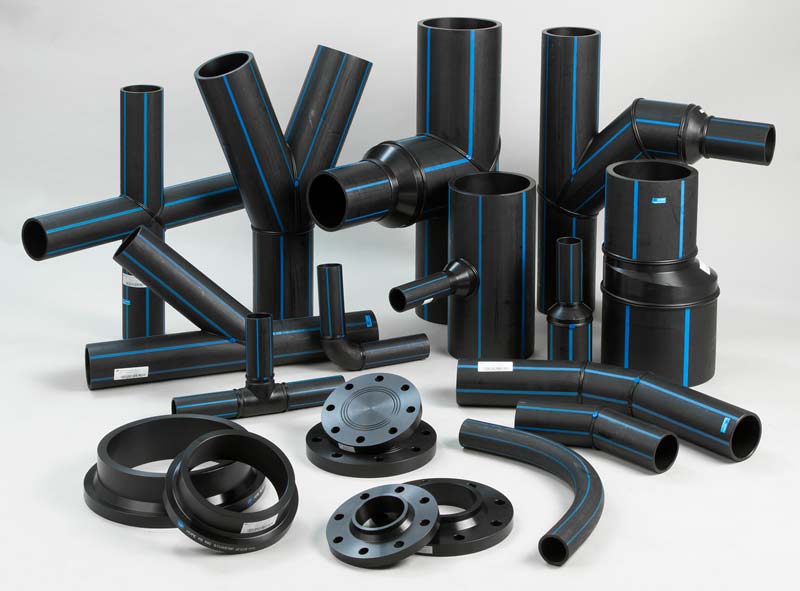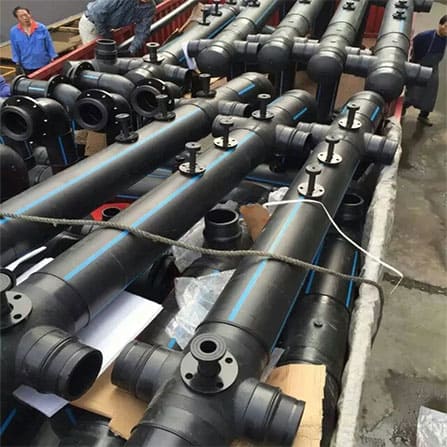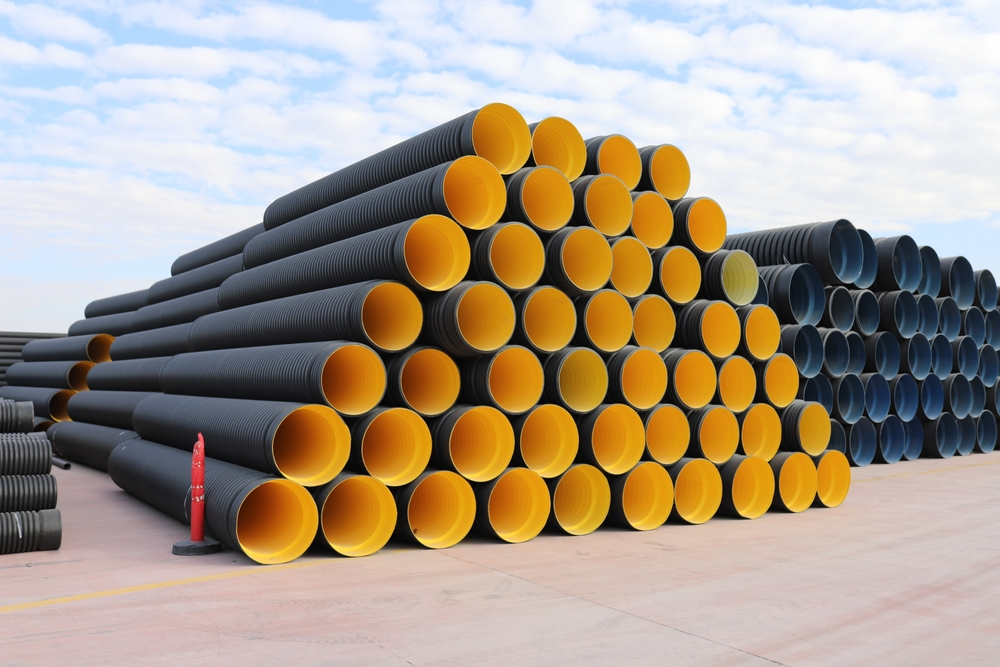HDPE Pipe Supplier checklist: what to ask
Wiki Article
Discovering the Leading Pipeline Manufacturers: High Quality, Dependability, and Innovation
The pipeline manufacturing sector stands at the intersection of development, reliability, and high quality, driven by leading firms such as Tenaris and Vallourec. These makers are not only devoted to generating high-performance materials however are also introducing lasting methods that resolve modern ecological concerns (HDPE Pipe Supplier). As we take a look at the criteria that define excellence in pipeline services, it ends up being evident that the landscape is quickly progressing. What details technologies are arising, and exactly how are these developments shaping the future of pipeline facilities? The answers may redefine sector standards in ways that are not yet completely comprehendedLeading Manufacturers Summary
In the domain name of pipeline manufacturing, a number of key gamers arise as leaders, each contributing considerably to the sector's landscape. Companies such as Tenaris, Vallourec, and JFE Steel have established themselves as frontrunners by continually delivering top notch items that satisfy rigorous industry criteria. Tenaris, renowned for its innovative remedies, focuses on smooth and welded pipes, catering mainly to the oil and gas industry. Vallourec, a French multinational, concentrates on the manufacturing of costs tubular options, highlighting sustainability and advanced technology in its manufacturing processes.JFE Steel, a significant Japanese manufacturer, is acknowledged for its comprehensive array of steel pipelines, particularly those utilized in power and facilities jobs. Their commitment to r & d has enabled them to produce high-performance products that withstand rough environmental problems. In addition, business like united state Steel and National Oilwell Varco have broadened their market presence by expanding their item offerings and improving functional performances.
These leading producers not only dominate the marketplace but likewise drive innovation within the market, setting criteria for top quality and reliability that gamers strive to accomplish. Their payments are crucial for meeting the raising demand for efficient and resilient pipeline remedies worldwide.
Standards for High Quality Analysis
Quality assessment in pipeline manufacturing rests on two essential criteria: material toughness criteria and producing procedure efficiency. Making sure that products fulfill strenuous toughness benchmarks is important for the durability and dependability of pipes. In addition, enhancing the manufacturing procedure can enhance efficiency while preserving premium quality, ultimately impacting overall performance and safety.Material Longevity Requirements
Guaranteeing the longevity and integrity of pipeline materials is essential for preserving framework stability and operational effectiveness. Material resilience standards play an essential role in assessing the quality of pipes, determining the efficiency and lifespan of the products utilized in building and construction. Manufacturers must stick to a range of strenuous criteria, including those set by organizations such as ASTM International and the American Oil Institute (API)These criteria assess various factors, consisting of deterioration resistance, tensile toughness, and tiredness efficiency. For example, pipelines used in destructive settings call for materials that can hold up against chemical destruction, while those subjected to high-pressure conditions must display phenomenal tensile stamina.
Additionally, variables such as temperature variations and environmental problems have to be taken into consideration, as these can significantly affect material actions gradually. Manufacturers frequently use innovative testing approaches, consisting of increased aging tests, to imitate long-term wear and guarantee that products meet or exceed industry criteria.
Manufacturing Process Performance
Manufacturers' ability to optimize making process performance is important for creating premium pipes that meet rigorous industry requirements. Effectiveness in producing directly affects cost administration, production timelines, and overall product stability. To attain this, leading pipeline manufacturers carry out innovative techniques such as lean manufacturing, automation, and real-time data analytics.Lean manufacturing concepts are vital in decreasing waste and optimizing resource application. By streamlining processes and getting rid of redundancies, manufacturers can enhance productivity while guaranteeing regular top quality. Automation modern technologies, consisting of robotics and computer system mathematical control (CNC) equipments, play an essential duty in boosting accuracy and lowering human mistake, consequently elevating the reliability of the end product.
In addition, making use of real-time information analytics permits suppliers to check manufacturing procedures constantly, enabling them to identify bottlenecks and make timely modifications. This positive strategy not only enhances performance yet likewise supports quality assurance methods by guaranteeing conformity with regulatory requirements.
Integrity in Pipeline Solutions
Reliability in pipeline options is critical, as it straight impacts the safety and security and effectiveness of fluid transport systems. Key variables consist of the toughness of materials made use of, adherence to strenuous screening and certification standards, and the incorporation of cutting-edge material services that improve efficiency. Recognizing these aspects is crucial for producers intending to deliver reliable pipeline facilities.Value of Longevity
Attaining sturdiness in pipeline solutions is important, as it directly influences the long-lasting efficiency and safety of framework. Long lasting pipes are necessary for minimizing upkeep prices and reducing the chance of catastrophic failures. This integrity is particularly essential in markets such as oil and gas, water, and wastewater monitoring, where the consequences of pipeline failure can be serious, both financially and eco.The materials and producing procedures used by pipeline manufacturers play a considerable function in figuring out the durability of the final item. Making use of high-quality basic materials, advanced modern technologies, and cutting-edge layout principles guarantees that pipes can hold up against numerous stress factors, consisting of stress fluctuations, temperature level variations, and destructive settings.
In addition, the durability of pipes is carefully connected to their capacity to resist exterior aspects such as dirt motion, seismic task, and chemical exposures. Reliable rust defense methods, such as coatings and cathodic security, better enhance the durability of pipelines, protecting them versus deterioration gradually.
Buying resilient pipeline services ultimately translates to raised functional efficiency, reduced downtime, and enhanced safety and security, verifying the important significance of durability in modern-day pipeline manufacturing.
Checking and Certification Standards
In the domain name of pipeline services, rigorous testing and accreditation requirements are vital to assure the reliability and safety of infrastructure. These criteria serve as standards for assessing the efficiency and resilience of pipeline products and systems, verifying they fulfill certain regulatory and market requirements.Examining procedures generally include different approaches, including stress screening, hydrostatic analyses, and non-destructive testing methods. These analyses are essential for identifying prospective weaknesses or problems in the materials before they are released in real-world applications. Additionally, qualification by acknowledged companies warranties that producers abide by developed standards, which fosters depend on amongst stakeholders, including specialists, end-users, and engineers.
Numerous prominent pipeline makers take part in constant monitoring and renovation of their screening protocols to adapt to progressing market criteria and technical advancements. Conformity with standards such as ASTM, ASME, and ISO not just enhances product reliability however likewise lessens the threat of ecological cases linked with pipeline failings.
Ingenious Product Solutions
The growth of cutting-edge product options has transformed the landscape of pipeline manufacturing, improving both efficiency and toughness. Advanced products such as high-density polyethylene (HDPE), cross-linked polyethylene (PEX), and composite materials have emerged as game-changers, offering superior resistance to deterioration, temperature level variations, and stress variations. These materials not just extend the life expectancy of pipelines yet also lower upkeep prices, making certain reputable lasting efficiency.Manufacturers are progressively embracing wise materials that incorporate sensors for real-time surveillance. This modern technology permits proactive upkeep, substantially enhancing reliability by detecting leakages or structural weak points prior to they rise into critical failings. The integration of nanotechnology has actually also resulted in the development of finishes that enhance the longevity of pipelines versus abrasion and chemical direct exposure.
Sustainability is one more vital focus, with producers exploring bio-based composites and recyclable products that reduce ecological impact. As governing criteria remain to progress, the focus on cutting-edge material remedies ends up being extremely important in conference stringent security and ecological requirements. Inevitably, these innovations not only improve the integrity of pipeline systems but also add to the overall effectiveness and sustainability of power transport infrastructures.
Advancements in Pipeline Modern Technology
Innovations in pipeline modern technology are revolutionizing the market by improving performance, safety and security, and ecological sustainability. Current developments concentrate on clever pipeline systems that use sensing units and IoT modern technology to keep an eye on problems in genuine time, making it possible for positive maintenance and reducing the danger of failures. These systems can find leaks, stress modifications, and various other abnormalities, permitting for rapid feedback and reducing ecological influence.Furthermore, the growth of innovative materials, such as composite and corrosion-resistant alloys, considerably prolongs the lifespan and reliability of pipes. Pipeline Manufacturer (American Plastics LLC HDPE Pipeline Manufacturer). These materials lower maintenance costs and improve performance in extreme settings, making them perfect for oil, gas, and water transport
Automation and robotics are playing a crucial function in pipeline construction and examination. Drones and robot tools promote studies and analyses of hard-to-reach locations, making certain extensive assessments without jeopardizing security.
Ingenious designs, such as modular pipeline systems, enable for better versatility in installment and adjustment, providing to the vibrant needs of the power sector. With each other, these technological improvements not just boost operational efficiency but also add to an extra resistant and lasting pipeline infrastructure, leading the way for a greener future.
Study of Success
Across numerous fields, successful applications of advanced pipeline innovations demonstrate substantial renovations in operational performance and security. One notable instance is the deployment of wise pipeline tracking systems in the oil and gas sector, where real-time information analytics have reduced leakage detection times by over 50%. This not just lessens ecological risks but likewise improves the total integrity of pipeline facilities.
In addition, a significant manufacturer applied robotic assessment innovations in its pipeline maintenance operations, resulting in a 40% improvement in examination performance. This approach has structured upkeep timetables and considerably lowered downtime.
These study highlight exactly how prominent pipeline producers are leveraging cutting-edge modern technologies to foster reliability and operational excellence, inevitably setting brand-new standards for the sector. As these successes remain to unfold, they lead the way for further developments in pipeline manufacturing and management.

Environmental Sustainability Practices
Often, pipeline manufacturers are focusing on ecological sustainability methods to alleviate their eco-friendly impact and improve the long life of their items. This dedication is reflected in different campaigns focused on minimizing waste, conserving energy, and making use of sustainable materials throughout the manufacturing procedure.
Numerous suppliers are adopting advanced modern technologies that decrease discharges and power intake. As an example, the assimilation of Texas Pipeline Manufacturer automated systems and energy-efficient equipment aids enhance manufacturing while reducing dependence on nonrenewable fuel sources. In addition, firms are significantly transforming to environment-friendly materials, such as recycled metals and bioplastics, which not just minimize the ecological influence however likewise promote a round economic situation.
Pipeline manufacturers are executing extensive lifecycle assessments to evaluate the ecological ramifications of their products from creation to disposal. This method enables them to identify possibilities for enhancement and foster liable sourcing and waste administration practices.
Partnership with environmental companies better enhances these efforts, as manufacturers look for to straighten their operations with worldwide sustainability goals. Eventually, these environmental sustainability methods not just add to a healthier planet however additionally setting suppliers as responsible leaders in the sector, appealing to environmentally conscious stakeholders and clients alike.
Future Fads in Pipeline Manufacturing
As the demand for a lot more lasting and effective infrastructure expands, pipeline manufacturing is poised for significant improvements that will improve the market. Key patterns anticipated in the coming years consist of the combination of innovative materials, such as corrosion-resistant and composite alloys, which enhance longevity while minimizing environmental impact. Manufacturers are likewise anticipated to take on innovative production methods, like additive manufacturing and automation, to enhance procedures, lower waste, and reduced prices.In addition, the rise of wise pipeline modern technologies, incorporating sensors and IoT devices, will enable real-time tracking and predictive maintenance, consequently boosting safety and security and functional performance. This electronic improvement will certainly not just enhance source management but also help with compliance with strict environmental regulations.
Sustainability will continue to be a central focus, driving manufacturers to spend in eco-friendly techniques, consisting of energy-efficient production methods and reusing efforts. As the worldwide emphasis on environment adjustment heightens, pipeline producers will certainly need to adapt by creating options that meet both environmental and financial demands.
Regularly Asked Concerns

What Industries Primarily Make Use Of Pipeline Products From These Manufacturers?
Pipeline items are primarily used in industries such as oil and wastewater, water and gas administration, chemical construction, mining, and handling. These markets depend on efficient, sturdy, and safe transportation of materials and fluids.
Exactly How Do Manufacturers Make Certain Conformity With International Pipeline Standards?
Manufacturers ensure conformity with global pipeline standards by applying extensive top quality control procedures, conducting regular assessments, sticking to well-known governing structures, and buying staff member training to advertise recognition and understanding of safety and security and top quality needs.What Is the Ordinary Life-span of Pipelines From Leading Manufacturers?
The ordinary life-span of pipelines from leading producers usually varies from 30 to 100 years, depending upon material, environmental problems, and upkeep techniques. HDPE Pipe Manufacturing Texas. Regular inspections and adherence to sector criteria markedly affect durability and efficiencyExist Certifications Particular to Pipeline Production High Quality?
Yes, numerous qualifications exist for pipeline producing quality, consisting of ISO 9001 for high quality monitoring systems and API criteria particular to pipes. These qualifications guarantee adherence to strenuous security, efficiency, and environmental standards within the sector.Exactly How Do Manufacturers Handle Pipeline Maintenance and Services?
Manufacturers normally execute an aggressive maintenance strategy that consists of normal assessments, keeping track of systems for very early detection of concerns, and a structured fixing protocol. This strategy assurances pipeline honesty, minimizes downtime, and boosts overall operational efficiency.Quality evaluation in pipeline manufacturing pivots on two essential requirements: product sturdiness standards and producing procedure efficiency - Pipeline Manufacturer. Product resilience requirements play an important function in reviewing the top quality of pipes, determining the performance and life expectancy of the materials used in building and construction. The materials and manufacturing procedures employed by pipeline manufacturers play a significant role in figuring out the longevity of the last item. The typical lifespan of pipes from leading producers usually varies from 30 to 100 years, depending on product, ecological problems, and upkeep techniques. Yes, numerous qualifications exist for pipeline making top quality, consisting of ISO 9001 for high quality administration systems and API standards specific to pipelines
Report this wiki page